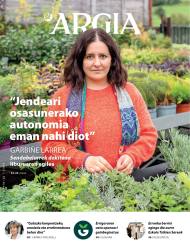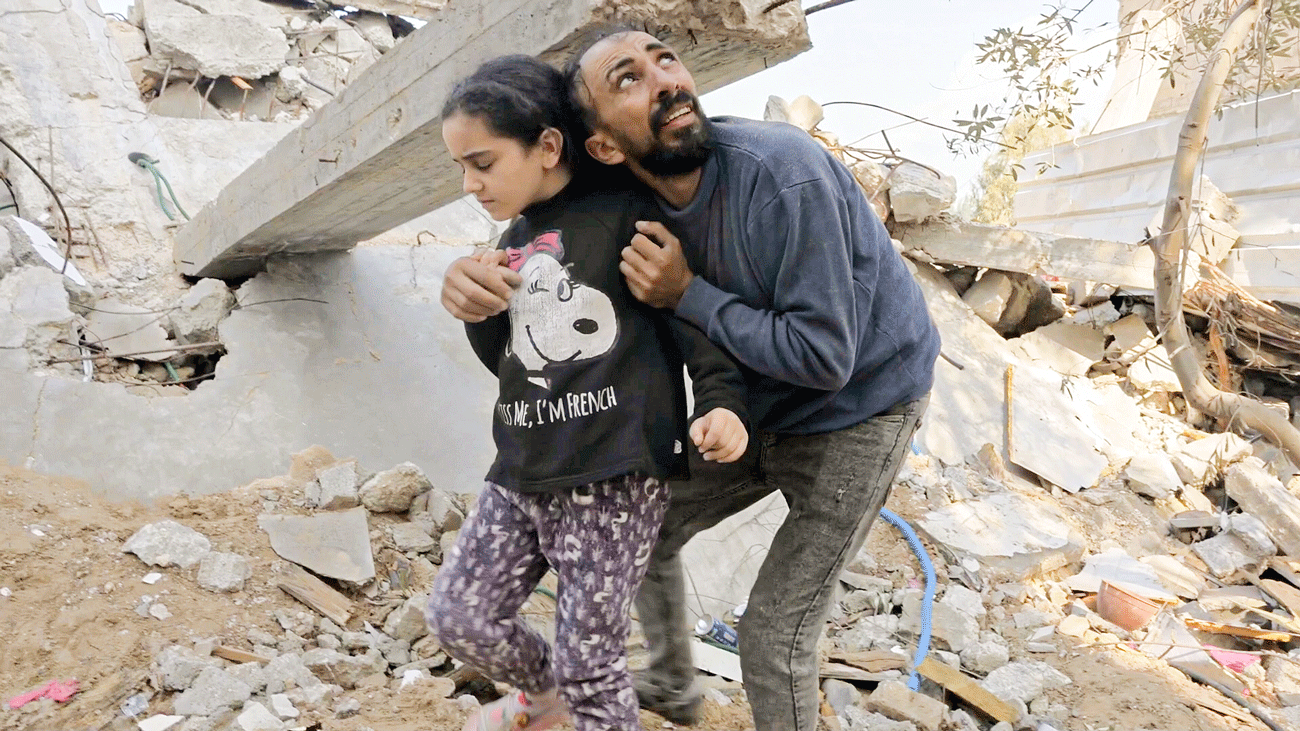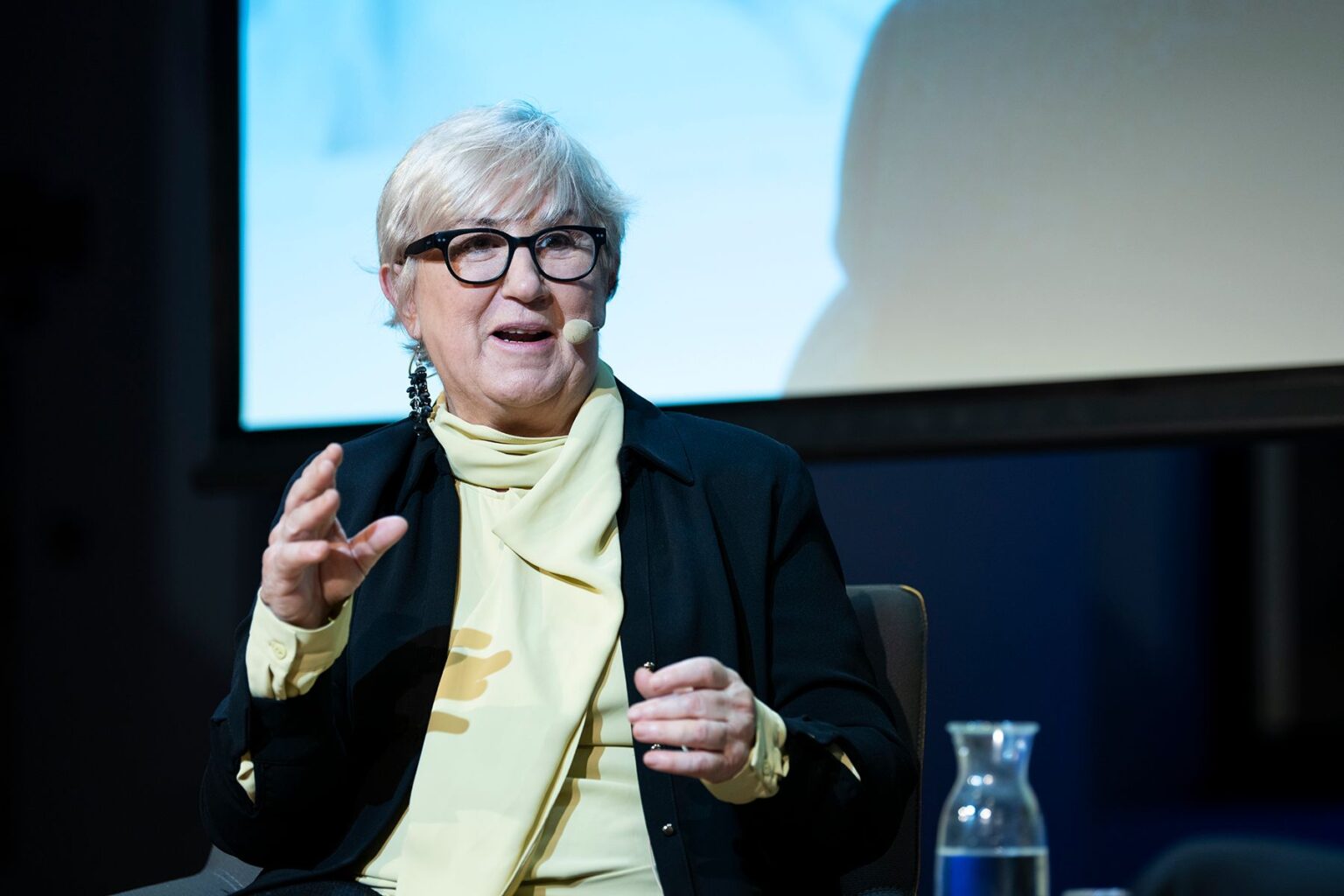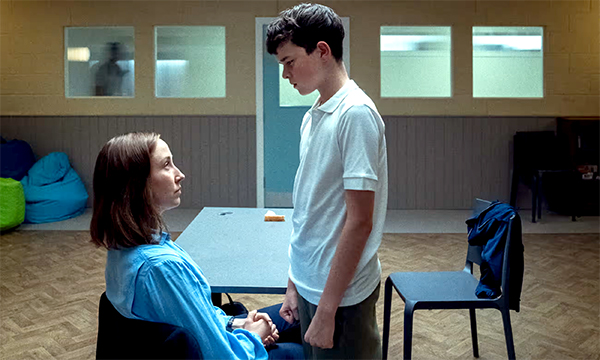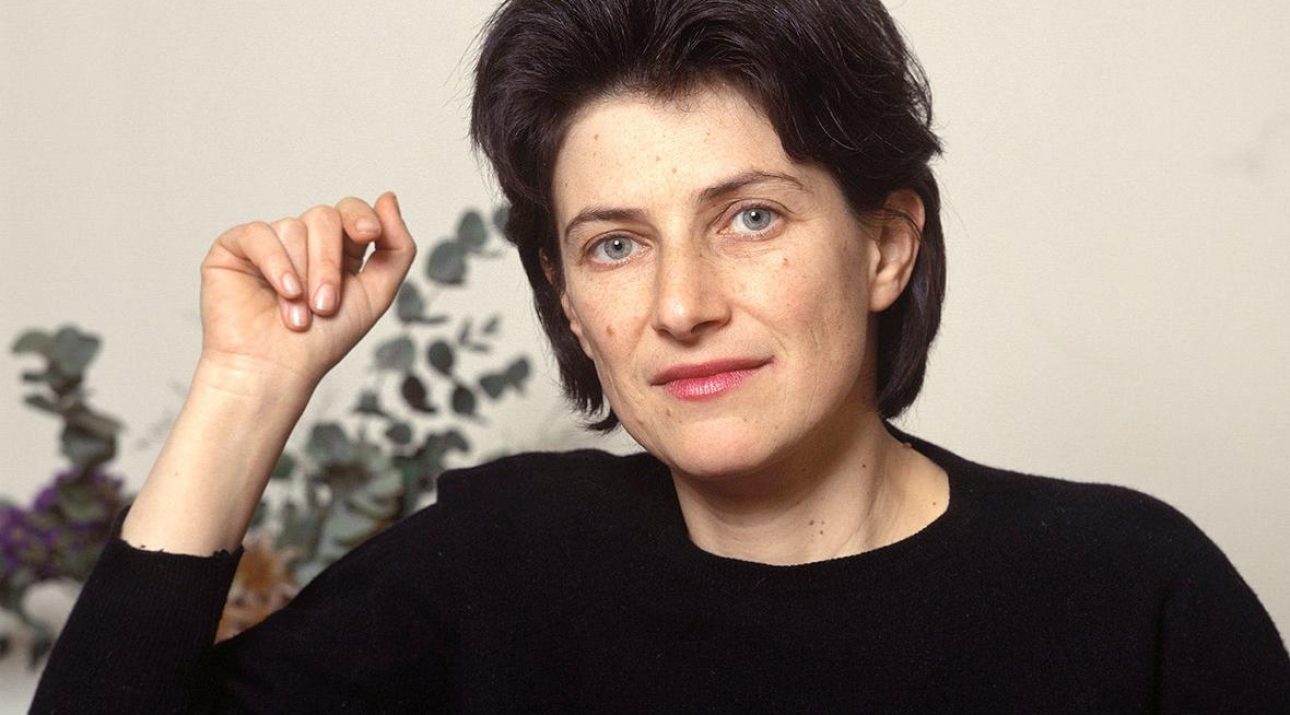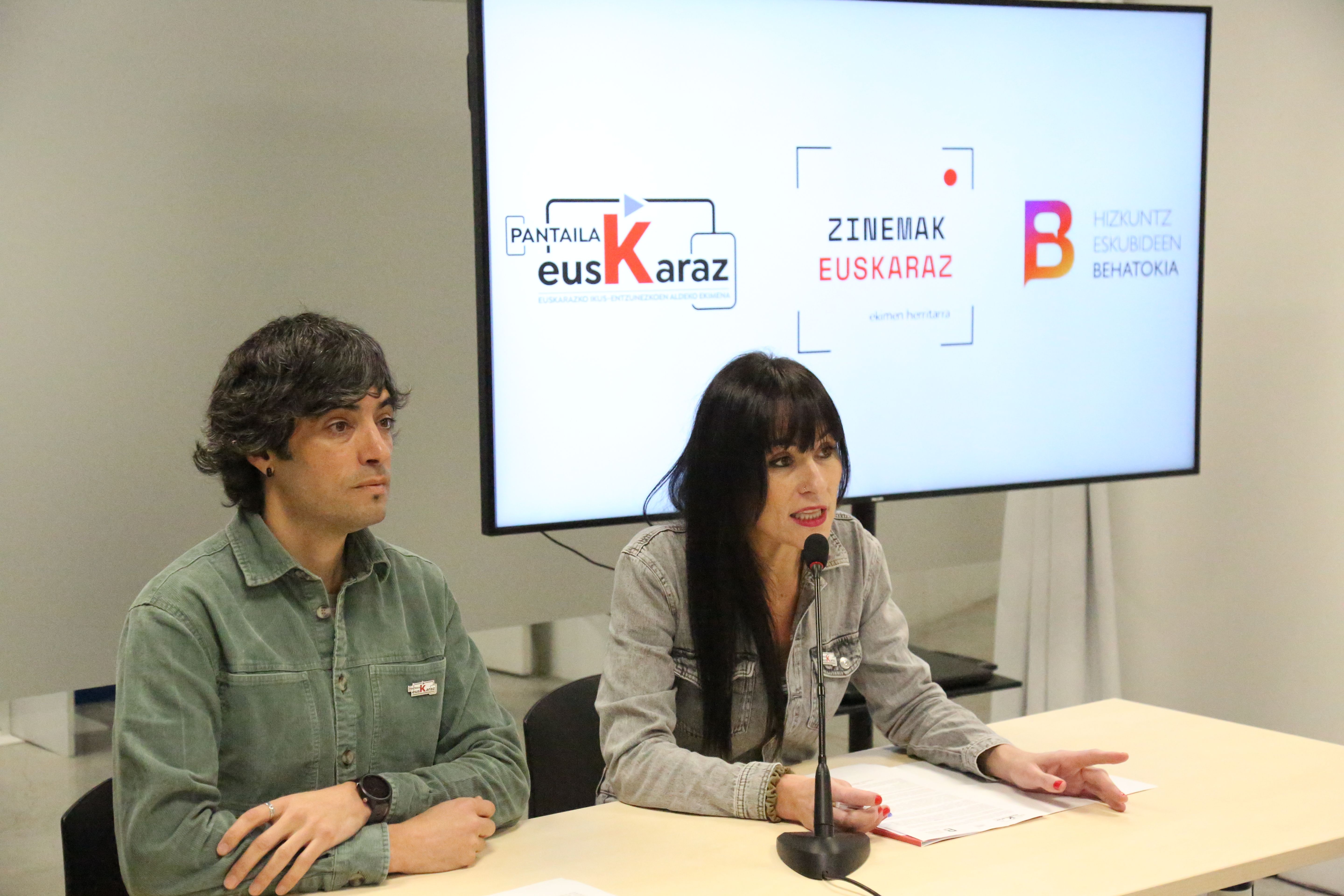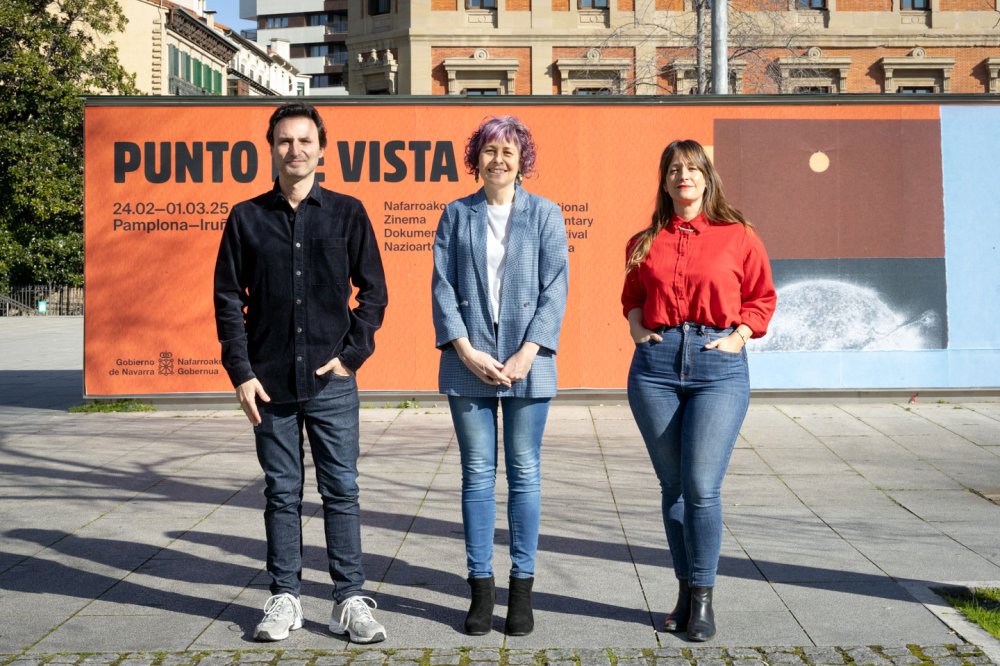“The film is a quest for personal success, to which Nora gives a new meaning”
- Although premiered at the San Sebastian 2020 Film Festival, Nora arrived at the cinemas in September of this year. Lara Izagirre (Zornotza, 1985) is the history of personal search through the less utopian road trip, the story of a family, the reflection on gender and the journey to be lost in the “Basque territory” in which we all gather. In addition to the metaphor games, the film has created something; although it has been done in Euskal Herria and in Euskera, in many Basque theatres it has been projected in Spanish.

Dying is not tragically understood in the film, it is the beginning, often against what we do in the Basque culture. Did you look for that counterpoint?
One of the foundations of life is where we look at things. Death is part of life, we will have it close throughout life: sometimes closer, sometimes less. But it will always be present. So, there's a proposal to look at death from life: how to live while we die, how to live when someone close to you dies. I think there are people who live like this, not fighting death, but assuming: “Will it happen and where do I live when this happens?” In the movie, every character has their point of view. Instead of entering the dark side of death, Nora sees the light and pays a tribute: to live for others when there are no.
The family is an obstacle to Nora. They only confer on them responsibilities that are not theirs. Why does he return to the family?
Nora, at the beginning of the film, lives for others. My grandfather has a lot of weight and there's a lot of care: I wanted to imagine that work and the bond with my family. For me, things aren't black or white, they're more complex. That is why, sometimes, leaving a care job is not something that only gives you freedom, perhaps related to the care work, for example in the case of Nora, there is a friendship and a very special relationship. So I didn't want it to have a burden. I think in the film there is also that difference, Grandpa is a “fortress” for Nora.
Once he decides to follow his path, Nora is very brave: he returns and does not run away, comments on the decisions he has made. This is the first time that you have not asked for authorization. And in this return it causes a change in the structure of the family, with a simple dialogue. These are two scenes, but they change everything and balance the space that each one has in that family. At the beginning of the film, at least, it's not very balanced, not caring, not anything else.
Merik, Nora’s friends, partner and children are the traditional models we call “ideal family”. But he's not happy. Why does Nora want that life at any price?

I think this is a “concept of success.” What are the family models in this society, both in the creative and the artistic world. There are some who consider themselves successful and others who seem not to have succeeded. Nora is at the beginning oriented towards the outside, he has a vision of social success that dominates, although he always takes another direction in his actions. It's a reflection about this film. I don’t know if it’s “success,” but there’s a reflection on “what you have to do and what you want to do.” There's the Nora conflict. The film is a quest for personal success, to which Nora gives a new meaning.
For me there's the most important part of the movie, the heart or the soul: how women give us opportunities, or not, to ourselves, or how many possibilities we have to give us opportunities, to decide what we want to do, but to our extent. I would say that it is not easy for us, because society is not prepared to ask us. This lack of habit gives us fear when we have the opportunity to ask ourselves these questions. Maybe we realize that we want to be somewhere else, but that's where bravery is needed, and we haven't been taught to be brave. So, I think on Nora's journey there's a journey of many women. The one that starts from the question, where are we and where are we going?
In the film, the role of the mother is very clear.
In these relationships between mothers and daughters of the film, the difficulty of understanding one another is reflected by the different times we have lived as women. The members of each generation have had different options to be able to do what we have wanted to do.
The film lacks two important interviews. On the one hand, ask Loli [Nora's mother]: “Where do you want to go? Where did you want to go and haven’t you gone?” And on the other hand, ask Mari Feli: “Why are you here and what impact it has had on your life?” If we were to our mothers asking what they want to be and where they are, and what they left without doing because they were in the world ... Many wounds and distances would be exposed. I think mothers and children are equal, but time creates a space for not understanding us.
In the film mixtures Hego Euskal Herria, Ipar Euskal Herria and Argentina, the Basque territory of the displaced. Why that choice?
I wanted to represent Euskal Herria as a whole. When Nora starts the journey, he needs to get lost, give himself a chance and find his place. But for that you have to get lost. There I found the possibility of traveling to the other end or close to the world. And it seemed to me that when you lost a close person, even going to the other end of the world isn't the best decision. So I decided that Nora would be lost in the Basque Country because I needed a support, even if I wasn't at home, to feel like I was at home.
Then came the Argentine side. On my part there was a will to make a colorful film, but not only in color, but in all senses: in language, in pluralism… Then I started thinking about who Nora’s grandfather could be, and as an admirer of a lot of Hèctor Alterio, I pressed her: “Why not talk about an Argentinian?” Furthermore, given the history we have with Argentina and South America, I think it is interesting that the family is formed in this way to explain who Nora is in this context.
"I have not obtained sufficient support from Basque culture – I mean institutions, not the public – which prevents me from saying that my third film is in Basque"
In an interview offered in EITB's Ahoz Aho program, she said that there are no women in Basque films in the usual. Why?
I would say that it is not only in the Basque film, but in the audiovisual in general that make fiction in Euskera. There is nothing else to do with the EITB series that have been carried out over these years, which have been led by zero women, and I would say that eight or eight have been done. This year they've been Nora and Erlauntza, but the previous Basque fiction directed by a woman, which I remember, is Amaren Eskuak, and it's not a job two years ago. We should reflect: we are promoting Basque cinema, but who did it? I would pay particular attention to one point: What's going on with the money that public television distributes? I would say that the Basque Government has decisions taken to protect a woman who dares to make a film in Basque. In the field of public television there is also a will, but then, in reality, I believe that there is a need for a review of the decisions they take when distributing public money.

The vision is therefore unique, and that is very dangerous for the women who come behind and for whom we are now. But it also poses a serious risk to the language. I would say that I decided not to make my first film in Euskera, because I did not want to overcome two difficulties at the same time: that of being the director of women and that of defending Euskera as a minority language. I think in my second film, I've had the courage to face them. But the realization of this second film has been difficult for these two reasons, and I have not achieved sufficient support from the Basque culture – I am referring to the institutions, not the public – which prevents me from saying that my third film is in Basque.
They've given a Spanish version of Nora in some theaters and they've projected it without warning it's duplicated.
After a meeting with Spanish Television and the distributor A Countercurrent, we decided to unfold the destination. In order to get a subsidy from television in Spain, we were told that we had to double the film – we do not know whether we had that obligation or not, but we believed that – and that we had to sign a contract. We then authorized A Countercurrent to sign the agreement with Spanish Television, but since the release date was very close, we could not wait for the signing of the contract to perform the dubbing.
After this dubbing, the film can reach more movie theaters. Only if it is in Basque will it reach 15% of the rooms, with doubling perhaps 50%. So we decided to double it.
"With whom perhaps that's why I've made some decisions, because I've thought about it. “The Basque will not come.” But then, the only version that has traveled around the world has been the Basque version: In Miami you've seen it in Euskera, in Manchester, in Nantes ..."
However, they have not achieved the dissemination they hoped for.
Distributors have to wager on a Basque film, and what happens is that that wager is small. In addition, they decide to give the original version of the film in national theatres. Therefore, the fact of having performed this dubbing has not spread the film to other circuits in Spain. On the other hand, to our surprise, several rooms in Euskal Herria have used the Spanish version: Multicines and Getxo, I don't know if there's been more.
Hence the debate. After all, there has been a need for an audience, because many preferred not to see the film, but to read the subtitles. Perhaps it is a representation of the people, of the use of the language in the people, and in that sense, I do not know if from the very beginning we had to set limits on the language to be used in every film. Indeed, I am totally surprised at what has happened. We haven't considered the film as a tool for it, and maybe we had to do it.

Do you have to justify a film in Basque?
If you're going to see a Spanish film here, nobody says anything; a Basque film is something you have to explain. If we have doubled, in one sense, give explanations. But if we want to build industry and culture in Euskera, and without duplication, what we want is to work on the normalization of Euskera, we should say from the institutions and from the diffusion of Euskera: What's the average of a movie of this kind, 50 copies? What can we do to make a Basque film have other copies of its Spanish counterparts? If not, the Basque will be here. In Euskal Herria we are getting more and more work done in other languages: Catalan, Galician films and series… But the Basque country has not yet started playing in that league.
Do the others have more support from the administration?
I don't know if it's that, or if it's a decision. For example, with Catalan, they have said: it is here, and it is not a minority language. Everyone has to believe, as a people. We have difficulty in believing that. And I with Nora maybe that's why I've made some decisions, because I've thought about it. “The Basque will not come.” But then, the only version that has traveled around the world has been the Basque version: In Miami you've seen it in Euskera, in Manchester, in Nantes ...
No other land dokumentalaren zuzendari Hamdan Ballal kolono sionistek jipoitu zuten astelehenean bere herrian, beste hainbat palestinarrekin batera, eta Israelgo militarrek eraman zuten atxilo ondoren. Astarte goizean askatu dute.
Donostiako Tabakaleran, beste urte batez, hitza eta irudia elkar nahasi eta lotu dituzte Zinea eta literatura jardunaldietan. Aurten, Chantal Akerman zinegile belgikarraren obra izan dute aztergai; haren film bana hautatu eta aztertu dute Itxaro Bordak, Karmele Jaiok eta Danele... [+]
35 film aurkeztu dira lehiaketara eta zortzi aukeratu dituzte ikusgai egoteko Euskal Herriko 51 udalerritan. Euskarazko lanak egiten dituzten sortzaileak eta haiek ekoitzitako film laburrak ezagutaraztea da helburua. Taupa mugimenduak antolatzen du ekimena.
Pantailak Euskarazek eta Hizkuntz Eskubideen Behatokiak aurkeztu dituzte datu "kezkagarriak". Euskaraz eskaini diren estreinaldi kopurua ez dela %1,6ra iritsi ondorioztatu dute. Erakunde publikoei eskatu diete "herritar guztien hizkuntza eskubideak" zinemetan ere... [+]
Geroz eta ekoizpen gehiagok baliatzen dituzte teknologia berriak, izan plano orokor eta jendetsuak figurante bidez egitea aurrezteko, izan efektu bereziak are azkarrago egiteko. Azken urtean, dena den, Euskal Herriko zine-aretoak gehien bete dituztenetako bi pelikulek adimen... [+]
Otsailaren 24tik eta martxoaren 1era bitartean, astebetez 60 lan proiektatuko dituzte Punto de Vista zinema dokumentalaren jaialdian. Hamar film luze eta zazpi labur lehiatuko dira Sail Ofizialean; tartean mundu mailako lau estreinaldi eta Maddi Barber eta Marina Lameiro... [+]
A conference for architects has just been held in Madrid to discuss the crisis of the professional architect. They have distinguished the traditional and contemporary way of being an architect. What is traditional? From the epic architect who appears in The Brutalist, where... [+]









